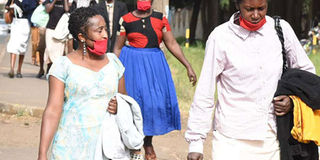Hope and new ways of being in the world

Members of the public in Eldoret town, Uasin Gishu County, wear face masks to limit the spread of Covid-19 disease on April 9, 2020. PHOTO | FILE | NATION MEDIA GROUP
What you need to know:
- We can hunker down for a bit while the scientists and health professionals do their thing, but eventually humanity will walk out of this, hopefully wiser.
- The best we can do is to learn the lessons we can from this pandemic so that we can put them to good use when the next one comes around.
Every passing day, our world is changing in a big way.
Four months ago, a virus is alleged to have jumped from an animal to a human, and then mutated in a way that allowed it to be transmitted from person to person.
In most of those infected, the human immune system has been able to fight off the virus and the patients have recovered without much trouble.
About a fifth of those infected have suffered more severe symptoms, with many requiring intensive care that places a heavy burden on even the best health systems in the world.
While in the beginning it was thought that the epidemic would be easily and quickly controlled like the previous ones - including Sars, Mers and H1N1 bird flu - this illness rapidly spread across the globe and morphed into a pandemic.
Today, no territory is spared, and millions of people are directly affected. Covid-19 has forced us to slow down or stop whatever it is we are doing, and to re-examine our values and way of life.
NEW BEHAVIOUR
It has exposed talents and values that would otherwise have gone unnoticed in our pre-Covid-19 ‘normal’ existence.
The world of policymaking has discovered a new way of doing things more efficiently.
We have learnt, for instance, that it is possible for many of us to get a lot of work done without spending a lot of money and resources on massive physical infrastructure.
Parliament can transact business without members of Parliament having to leave their constituencies.
Some university programmes can be delivered without the need for physical classrooms. Some patient care can be provided without the patient having to leave their house.
New behaviour can be learnt within a matter of days, such as physical distancing and avoiding handshaking.
Importantly, we are learning that we cannot make health policy that segregates our populations based on socio-economic status.
Infectious agents will exploit the weakest link in the health system to eventually reach even those that thought they are well protected.
This applies to countries as much as it does to individuals. Wealthier countries must become interested in the health systems of poorer countries, because all a pandemic needs is a suitable nucleus from which it will spread to all corners of the world.
LEARN, REBUILD
Leaders are learning that it is useful to listen to health experts when they make health policy. Many who ignored scientific evidence proffered by experts have lived to regret it, at huge national and even personal cost.
Articulate health leaders have become prominent faces of hope in this pandemic.
People have learnt to appreciate the huge amount of work that goes on behind hospital and laboratory walls to ensure that we remain safe and healthy even in the most dangerous of times.
In the midst of this uncertainty and fear, there is one more thing we need to learn. We must remain hopeful and plan for life after Covid-19.
No matter how long it takes, the pandemic will run out of steam. We can hunker down for a bit while the scientists and health professionals do their thing, but eventually humanity will walk out of this, hopefully wiser, but definitely stronger.
The best we can do is to learn the lessons we can from this pandemic so that we can put them to good use when the next one comes around.
Lukoye Atwoli is Associate Professor of Psychiatry at Moi University School of Medicine.





